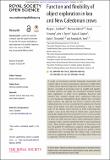Function and flexibility of object exploration in kea and New Caledonian crows
Abstract
A range of non-human animals frequently manipulate and explore objects in their environment, which may enable them to learn about physical properties and potentially form more abstract concepts of properties such as weight and rigidity. Whether animals can apply the information learned during their exploration to solve novel problems, however, and whether they actually change their exploratory behavior to seek functional information about objects have not been fully explored. We allowed kea (Nestor notabilis) and New Caledonian crows (Corvus moneduloides) to explore sets of novel objects both before and after encountering a task in which some of the objects could function as tools. Following this, subjects were given test trials in which they could choose among the objects they had explored to solve a tool-use task. Several individuals from both species performed above chance on these test trials, and only did so after exploring the objects, compared with a control experiment with no prior exploration phase. These results suggest that selection of functional tools may be guided by information acquired during exploration. Neither kea nor crows changed the duration or quality of their exploration after learning that the objects had a functional relevance, suggesting that birds do not adjust their behavior to explicitly seek this information.
Citation
Lambert , M L , Schiestl , M , Schwing , R , Taylor , A H , Gajdon , G K , Slocombe , K E & Seed , A M 2017 , ' Function and flexibility of object exploration in kea and New Caledonian crows ' , Royal Society Open Science , vol. 4 , no. 9 , 170652 . https://doi.org/10.1098/rsos.170652
Publication
Royal Society Open Science
Status
Peer reviewed
ISSN
2054-5703Type
Journal article
Description
Data collection with the New Caledonian crows was funded by an International Seedcorn Award from the University of York to M.L.L. This study was supported by a Rutherford Discovery Fellowship (A.H.T.). Our data are deposited at: http://dx.doi.org/10.5061/dryad.dq04j [48].Collections
Items in the St Andrews Research Repository are protected by copyright, with all rights reserved, unless otherwise indicated.

